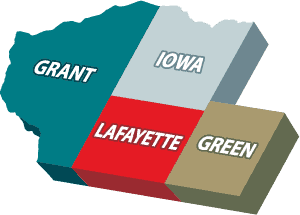November 6th Election: Voting Resources for Voters with Disabilities
Frequently Asked Questions about the November 6th Election
DRW and the Wisconsin Disability Vote Coalition have developed an “FAQ” document with some of the most common questions we receive about the November 6th Election, and brief responses. It is posted on our website. We encourage you to review this document, which includes some of the basics about voting in Wisconsin, as well as information about disability related accommodations and voting rights.
Check out our November 6th Election FAQ for answers to common questions about voting:
Competency, Guardianship, and Voting in Wisconsin
In Wisconsin, a person under guardianship retains the right to vote unless the court expressly removes it.
- +If an individual is under guardianship and unsure of their right to vote, the Court’s decision regarding the right to vote will be recorded on a court form called “A Determination and Order on Petition for Guardianship Due to Incompetency.” (GN-3170).
- +The language in the court order will not specifically say that the person has retained the right to vote, however, a box will be checked if the right has been removed.
- +If someone is under guardianship and not sure if they have the right to vote, here’s how to learn more:
- +Ask their guardian to look at the “Determination and Order form” mentioned above to see if their right to vote was removed. A copy of this form may be requested from Probate Court in their county (costs about $2.00 to get a copy).
- +Contact the Municipal Clerk for their community. The Clerk can check the list they receive from the state of individuals adjudicated incompetent and ineligible to vote.
- +A person who has a guardian and has lost the right to vote may petition the court to restore their right to vote (Wis. Stat 54.64(2)(a)).
Disability Rights Wisconsin has a brochure with information on Competency, Guardianship and Voting:
Absentee Voting in Residential Care Facilities and Retirement Homes
Voting is a constitutional right. The Legislature recognized that it is difficult for some individuals to get to their polling place on election day, including individuals residing in Residential Care Facilities such as a nursing homes, community based residential facilities (CBRF), residential care apartment complex, and adult family homes.
To encourage residents to participate in the electoral process, special procedures have been established for absentee voting in residential facilities. This includes the use of Special Voting Deputies (SVD) who helps to administer an absentee ballot.
A Special Voting Deputy will visit if:
- 1. There are at least 5 people registered to vote in the municipality where the facility is located; and
- 2. At least one resident has requested an absentee ballot for the election.
- 3. The clerk may also choose to send Special Voting Deputies if the facility does not meet the statutory threshold whereby they are required to send Special Voting Deputies.
Note: Contact the Municipal Clerk for the community where the facility is located to determine if a Special Deputy will visit. For contact information go to https://elections.wi.gov/clerks/directory
Resources from the Wisconsin Election Commission on Absentee Voting in Residential Care Facilities and Retirement Homes
Click on the following links to access Wisconsin resources which explain the procedures for absentee voting in Wisconsin residential care facilities and qualified retirement homes. These procedures have been developed in order to encourage residents of these facilities to participate in the process of choosing their elected representatives.
- +Absentee Voting in Residential Care Facilities and Retirement Homes Manual:
https://elections.wi.gov/publications/manuals/nursing-home-absentee
- +Webinar on Special Election Deputies:
https://elections.wi.gov/publications/video/2018SVDs
- +Elderly Voters and Voters with Disabilities- Guide to Voting in Wisconsin
https://elections.wi.gov/node/3614
Other Resources from the Wisconsin Election Commission
+Wisconsin Election Guide for Hospitalized Electors
- https://elections.wi.gov/sites/default/files/publication/154/hospitalized_electors_wi_voter_guide_pdf_16048.pdf
- Summary: If you are in the hospital on election day or the 7 days prior to election day, you can have someone bring you an absentee ballot.
+Wisconsin Voter Guide for Homeless Voters
- https://elections.wi.gov/node/3622
- Summary: Homeless voters are eligible to vote in Wisconsin. When registering, they may use a letter from a social service agency as proof of residence. They will need to show a photo ID
+Absentee Voting Guide and Absentee Application
+Resources for Voting Questions
These are some of key go to resources for your voting questions:
- Wisconsin Elections Commission https://elections.wi.gov/
Toll free help line: 1-866-VOTE-WIS, staffed Monday – Friday from 7:45 AM – 4:30 PM. Questions can also be emailed to elections@wi.gov. - MyVote Wisconsin https://myvote.wi.gov/en-us/
Resource for voters to check out their information including if they are registered to vote, what is their polling place, and view what’s on the ballot.
Voters may also register online. October 17, 2018 is the last day to register online for the November 6 election.
- Bring It to the Ballot https://www.bringitwisconsin.com/
Information about Photo ID for voting.
- Wisconsin Municipal Clerks are responsible for administering elections for their municipality. The Clerk is a resource for your voting questions, including questions about absentee voting. Contact information for municipal clerks is online at https://elections.wi.gov/clerks/directory
- Disability Rights Wisconsin Voter Hotline 1-844-DIS-VOTE
A resource for disability related questions about voting, including voting rights, and help addressing a concern or filing a complaint.
- Wisconsin Disability Vote Coalition
Provides resource information, as well as providing some training and outreach support for voters with disabilities and providers. Coordinated by Disability Rights Wisconsin and Wisconsin Board for People with Developmental Disabilities (BPDD).
Call DRW at 414-773-4646
- Web site: http://www.disabilityvote.org/
- Facebook: https://www.facebook.com/wisconsindisabilityvote/
About DRW. Disability Rights Wisconsin (DRW) is the Protection and Advocacy Agency for Wisconsinites. DRW receives federal funding as part of the Help America Vote Act of 2002 (HAVA) to provide education, training, and assistance to individuals with disabilities that will promote their full participation in the electoral process, including registering to vote, casting a vote and accessing polling places. Much of our voting work is advanced through the Wisconsin Disability Vote Coalition. We can be a resource for you and your residents if you have questions about voting in Wisconsin.

